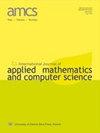一种基于人工神经网络的可扩展散列算法
IF 1.2
4区 计算机科学
Q3 AUTOMATION & CONTROL SYSTEMS
International Journal of Applied Mathematics and Computer Science
Pub Date : 2021-12-01
DOI:10.34768/amcs-2021-0048
引用次数: 3
摘要
云计算(CC)的显著优势导致其使用在过去几年中呈爆炸式增长。从安全的角度来看,CC系统必须提供符合国际标准和法规的解决方案。在本文中,我们提出了一个具有可扩展输出的哈希函数模型。该模型基于经过训练的人工神经网络来模拟麦基-格拉斯时间序列的混沌行为。这种散列方法可用于数据完整性检查和数字签名生成。它支持根据用户需求和由于可伸缩输出而产生的时间限制来构造加密服务。进行了大量的仿真实验来证明其密码强度,包括三个测试:位预测测试、序列测试和汉明距离测试。此外,还使用CloudSim模拟器(模拟带有全局调度程序的云)运行灵活的散列函数性能测试,以调查可能花费在可扩展散列协议上的虚拟机空闲时间消耗的可能性。结果表明,所提出的哈希方法可用于构建轻量级密码协议。它还支持整合完整性检查算法,从而降低批处理任务处理期间虚拟机的空闲时间。本文章由计算机程序翻译,如有差异,请以英文原文为准。
An ANN-based scalable hashing algorithm for computational clouds with schedulers
Abstract The significant benefits of cloud computing (CC) resulted in an explosion of their usage in the last several years. From the security perspective, CC systems have to offer solutions that fulfil international standards and regulations. In this paper, we propose a model for a hash function having a scalable output. The model is based on an artificial neural network trained to mimic the chaotic behaviour of the Mackey–Glass time series. This hashing method can be used for data integrity checking and digital signature generation. It enables constructing cryptographic services according to the user requirements and time constraints due to scalable output. Extensive simulation experiments are conduced to prove its cryptographic strength, including three tests: a bit prediction test, a series test, and a Hamming distance test. Additionally, flexible hashing function performance tests are run using the CloudSim simulator mimicking a cloud with a global scheduler to investigate the possibility of idle time consumption of virtual machines that may be spent on the scalable hashing protocol. The results obtained show that the proposed hashing method can be used for building light cryptographic protocols. It also enables incorporating the integrity checking algorithm that lowers the idle time of virtual machines during batch task processing.
求助全文
通过发布文献求助,成功后即可免费获取论文全文。
去求助
来源期刊
CiteScore
4.10
自引率
21.10%
发文量
0
审稿时长
4.2 months
期刊介绍:
The International Journal of Applied Mathematics and Computer Science is a quarterly published in Poland since 1991 by the University of Zielona Góra in partnership with De Gruyter Poland (Sciendo) and Lubuskie Scientific Society, under the auspices of the Committee on Automatic Control and Robotics of the Polish Academy of Sciences.
The journal strives to meet the demand for the presentation of interdisciplinary research in various fields related to control theory, applied mathematics, scientific computing and computer science. In particular, it publishes high quality original research results in the following areas:
-modern control theory and practice-
artificial intelligence methods and their applications-
applied mathematics and mathematical optimisation techniques-
mathematical methods in engineering, computer science, and biology.

 求助内容:
求助内容: 应助结果提醒方式:
应助结果提醒方式:


